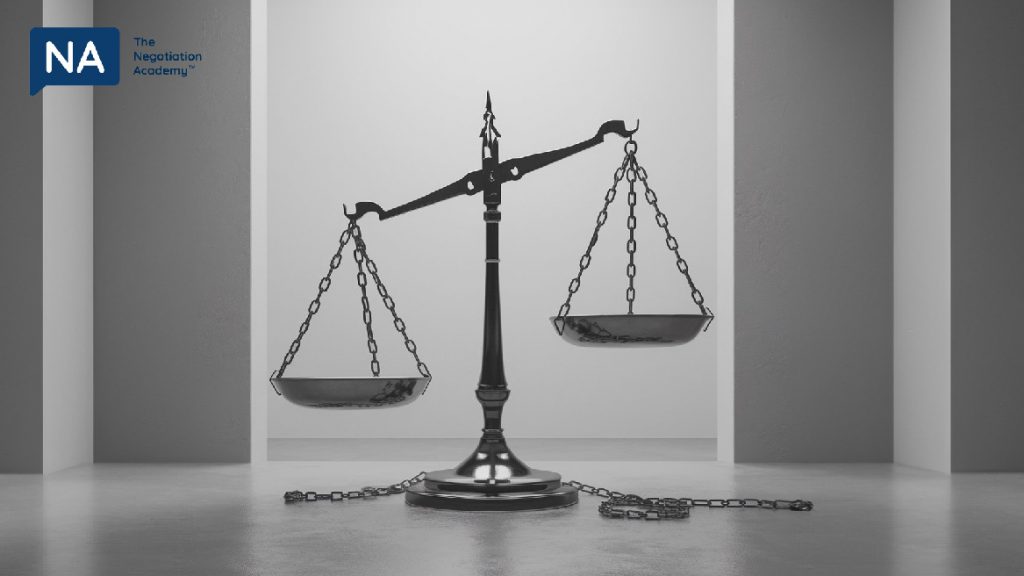
As you and your friend walk down the street, you spot a 10-dollar bill.
“Cool, let’s split it 50:50”
“Good idea, that sounds fair”
Now, wait just a minute…
Both parties instantly agreed that it was fair, even though neither party did anything to earn it. But why did we care if the outcome was fair or not?
As much as we’d like to think we’re rational, biases often influence our decisions, especially regarding cognitive biases in negotiations. In addition to framing and emotions, a sense of fairness is another frequently overlooked factor.
If either side feels the outcome is unfair, they will not accept it. We sometimes care more about fairness than rationality; as much as we hate to admit it, we are much less rational than we think. What makes this more complicated is that people tend to have different ideas of what is ‘fair,’ too.
How Fairness Affects Negotiations
In economics, a fairness bias prioritizes equitable or fair outcomes, even if they sometimes come at a cost to oneself.
People often reject offers that are perceived as unfair, even if it results in a loss. A study on public perceptions of fairness revealed that people consider it unfair for firms to impose losses relative to a reference point, such as the pre-existing price, wage, or rent.
For example, a study revealed that 82 percent of participants found it unfair for a hardware store to raise snow shovel prices after a storm, despite the economic rationale.
The 10-dollar example above is a variation of Thaler’s Ultimatum Game. In the game, the researchers offer people a sum of money, but both sides must agree on how to split the money, or neither side will receive anything. (Thaler, 1988).
Rationally, just accepting the offer already gives them more money than earlier. However, people preferred to receive nothing by rejecting the offer rather than accepting what they viewed as an unfair share. Offers closer to a 50:50 split were perceived as more ‘fair.’
Parties may reject offers they perceive as unfair, even if the offer would benefit them. This can lead to negotiation breakdowns or missed opportunities for agreement.
Perceptions of unfairness can stretch beyond just the outcomes on the table. If the negotiating parties have a history of conflict and perceive being treated unfairly, they may become less cooperative. This could lead to conflict and make it harder to reach a deal. This is often seen in labor disputes where employees feel they are not fairly compensated for their contributions.
A perception of fairness is also crucial to long-term relationships between parties. If one side feels treated unfairly, it can damage trust and reduce the likelihood of successful future negotiations. Conversely, perceptions of fairness can enhance trust and facilitate smoother negotiations in the future.
Types of Fairness Norms
Sometimes, the reverse is true when it comes to negotiations. Max Bazerman, Straus Professor at Harvard Business School, notes that in negotiations, parties interpret what’s fair in terms of what will benefit them the most. This includes both the counterparty and ourselves.
He noted that there are four main norms that people use when perceiving something as fair:
- Equality – everyone receives a similar outcome
- Equity – people are rewarded based on how much effort and input they put into the pie being split
- Need – Disregarding input, people are rewarded based on their current needs, such as family needs
- Status Quo – Going back to existing splits without any radical changes

Handling Fairness in Negotiations
We must appear fair during negotiations without getting too caught up in being fair ourselves. In the meantime, we also need to see if our perception of fairness is self-serving. Being aware of our own cognitive biases in a negotiation is the first step to overcoming them.
Fairness can be used to signal their interests and why they are gunning for their desired outcomes. With the various fairness norms available to us, we can return to focusing on interests rather than positions and use what our counterparty perceives as ‘fair’ as a signal for what is important to them.
We can try to build an objective standard of fairness for the negotiation that both sides can agree on, and frame offers around that. While working on that standard, we can also frame our offers and concessions around their perception of fairness to keep the negotiations going.
Want to hear more about the cognitive biases we experience during negotiations first-hand?
Joining one of our courses will put you on par with over 10,000 leading lawyers from Fortune 500 companies to Tier 1 law firms globally, boosting your negotiation skills to new heights.
Happy Negotiating!
Claudia Winkler
If you enjoyed this content, join our free 10-week Email course on the fundamentals of Collaborative and Competitive Negotiation skills by clicking HERE.
Each week, you will get a bite-size email unpacking some of the most fundamental negotiation concepts that you can apply in your everyday negotiations, along with an insight video and book recommendation to go further in areas you want to learn more about.
References:
- Kahneman, D., Knetsch, J. L., & Thaler, R. (1986). Fairness as a Constraint on Profit Seeking: Entitlements in the Market. The American Economic Review, 76(4), 728–741. http://www.jstor.org/stable/1806070
- Kahneman, D., Knetsch, J. L., & Thaler, R. (1986). Fairness as a Constraint on Profit Seeking: Entitlements in the Market. The American Economic Review, 76(4), 728–741. http://www.jstor.org/stable/1806070
- Anomalies: The Ultimatum Game – American Economic Association
- When Employees Think the Boss Is Unfair, They’re More Likely to Disengage and Leave
- Nancy A. Welsh and Nancy Welsh, Fairness: Perceptions of Fairness in Negotiation, 87 Marq. L. Rev. (2004).
- Fairness in Negotiation – Program On Negotiation Harvard


